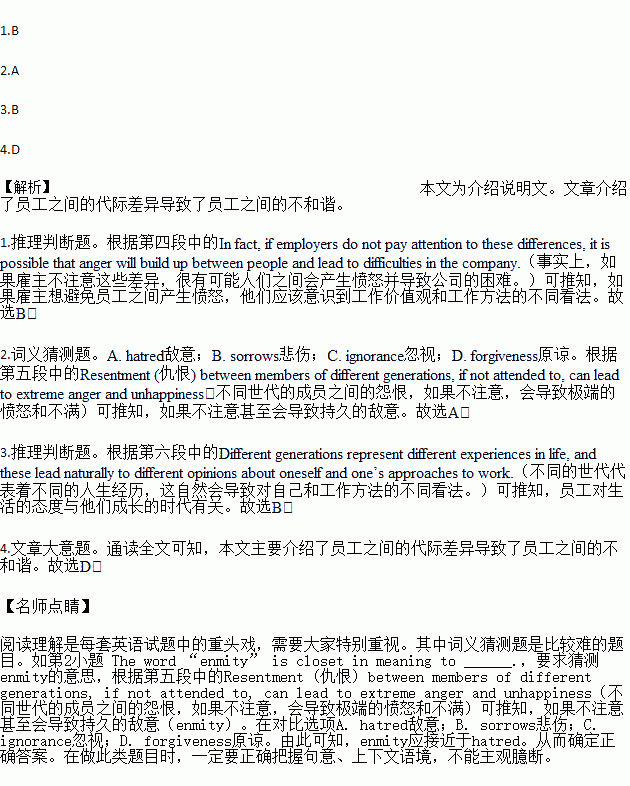题目内容
Today’s workplace is unique in history. Never before have we seen people working together who represent such different backgrounds and experiences. This difference of age, race, gender, and work style makes it very difficult to organize and run a company.
As a result, companies are looking for individuals who can manage a wide range of employees effectively. Increasingly, managers are discovering that age differences among workers are a major cause of concern.
This has been an important realization. The management difficulties and challenges have led some experts to study intergenerational differences for an understanding of problems in the workplace. What they have discovered is interesting and may provide ways of improving working conditions in companies that employ individuals from different generations.
The first thing to realize, they say, is that differences of opinion about the importance of work and how to get work done are not a coincidence. That is, it is not an accident that young employees will be different from older employees. In fact, if employers do not pay attention to these differences, it is possible that anger will build up between people and lead to difficulties in the company.
Resentment (仇恨) between members of different generations, if not attended to, can lead to extreme anger and unhappiness and even lasting enmity if people are not careful. That individuals from different generations should come to view each other as if they were from different sides of warring countries should not be surprising.
It is natural for individuals from the same generation to form alliances (联盟), to come together for protection. Different generations represent different experiences in life, and these lead naturally to different opinions about oneself and one’s approaches to work.
If you were raised in a time of plenty, when products were readily available and relatively inexpensive, you would believe that prosperity is natural and expectable. If, on the other hand, you were raised in a time of scarcity, you would always be careful not to waste things for fear you would not have enough. You would make angry people who seem to believe that problems will always solve themselves. Such optimism in the face of difficulties would be a source of unhappiness between you and them. It is difficult, in such circumstances, to achieve a happy, agreeable atmosphere in the workplace.
1.According to the experts, employers should realize ______ if they want to avoid anger between employees.
A. the different understanding of problems in the workplace
B. the different views on value of work and working methods
C. the different genders of employees in the workplace
D. the different ways of expressing anger in the company
2.The word “enmity” is closet in meaning to ______.
A. hatred B. sorrows
C. ignorance D. forgiveness
3.What can be inferred from the passage?
A. Employees in some companies regard each other as mere enemies.
B. Employees’ attitudes towards life are related to the time when they grow up.
C. Employees who are raised in a time of scarcity tend to be angry with others.
D. Achieving a harmonious atmosphere in the workplace is the main task for employers.
4.What does the writer mainly talk about in the passage?
A. Employees should be cooperative and friendly with each other.
B. It is difficult for employers to have workers work in a friendly way.
C. The weakness of human nature causes the anger between employees.
D. The generational differences cause the disharmony among employees.
 名校课堂系列答案
名校课堂系列答案
